PRESERVING A MILITARY LEGACY FOR FUTURE GENERATIONS
The following Reflections represents ET2 Michael Brown’s legacy of his military service from 1963 to 1967. If you are a Veteran, consider preserving a record of your own military service, including your memories and photographs, on Togetherweserved.com (TWS), the leading archive of living military history. The following Service Reflections is an easy-to-complete self-interview, located on your TWS Military Service Page, which enables you to remember key people and events from your military service and the impact they made on your life. Start recording your own Military Memories HERE.
Please describe who or what influenced your decision to join the Navy.

Three members of my family served in the US Navy. Two graduated from Annapolis in the early 1920s. One served as a Destroyer Captain up until the war began. He told me sea stories of in 1941, tracking German submarines off the coast of Africa as part of the Lend-Lease Program with Great Britain. The other one was discharged from the service as soon as he graduated because the US fleet was gearing down in the post-WW1 era due to more Dems in power, which was always their first way to save money. Their little brother served on USS West Point AP-23, carrying troops to Europe. He attended boot camp in Idaho and then served as a helmsman on Atlantic crossings in U-Boat-infested waters. I think he attended Quartermaster School in Idaho.
My father never served, but he influenced my decision to become a Navy man by asking just a single question. A month after my high school graduation, he asked me, “Why are you still here?”
Whether you were in the service for several years or as a career, please describe the direction or path you took. What was your reason for leaving?

I may have served just four years, but that has lasted me a lifetime, and I regret not one moment of my time on ships. To be a China Sailor was my goal from the minute I first heard the term in boot camp, and I got to be just that while serving with the Seventh Fleet in my home port of Subic Bay. I saw lots of the world.
My reason for leaving the Navy after a single hitch was pretty much like most everyone. I wanted to begin my life outside of the world of regimentation. A family looked to me like the best way to live, and from what I saw, many guys raising families in service had it pretty rough with the constant deployments. Vietnam looked like it was really going to be a thing, so I decided to give up the sea and take on the role of a family man. And I never regretted that decision either. I am a China Sailor and a Family Man, and I am a success in this world of today.
If you participated in any military operations, including combat, humanitarian and peacekeeping operations, please describe those which made a lasting impact on you and, if life-changing, in what way?

I served aboard USS Platte AO-24, a fleet oiler with Task Force 77 in waters of the Vietnam operations area called Yankee Station. During my two nine-month deployments, I saw thousands of refueling ops and resupply transfers at sea. It was a different experience, and perhaps it got to be a bit of a bore after a time. It was so constant, by night and day, that after a while, you didn’t even look up when an aircraft carrier steaming just a hundred fifty feet off the port side was recovering her planes during unrep or launching them on sorties against the north. But there were times when things happened where the boredom was broken.
One such incident occurred in bright daylight just three miles off the coast of Vietnam in crowded fishing waters. The locals operated long fishing net systems and manned them with family junks and small bamboo rafts. The Viet people had done it like that since time unremembered, and we were in their waters with our large ships steaming at twelve knots in straight lines hour after hour in unrep mode. Don’t you know they resented our being there?
I first heard the ship’s horn, a loud steam horn used only in times of distress, while working in the ops department berthing area. Coming on deck, I saw many men lining the port rail looking forward at the space between us and the carrier linked to us with fuel hoses. The water between the two of us was a turmoil of white foam with six to eight-foot swells.
I saw, as did the entire crew on deck, that we were heading right for both a junk and one of the small rafts, a family tending their nets and not attempting to move out of our way. The ships’ horns played for at least five minutes before overcoming the frightening visage before our eyes. We knew that we could not turn and would not turn.
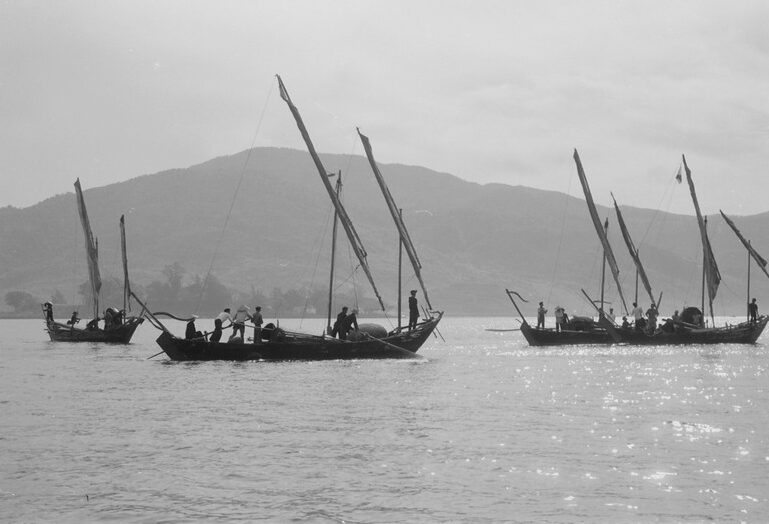
I saw first that a man on a small raft disappeared beneath our bow, my mind trying to come to grips with what must be happening to his body as he was dragged the five hundred eighty-foot length of our ship and toward our twin 15-foot screws propelling us ahead. I can only hope he died quickly. It occurred to me as it was happening that he was actually being keelhauled, a most grisly form of execution from the days of sail.
Seconds later, the moving water overcame the junk, and it upended, first upright, then down to the left. From the crowded deck came the scrambling forms of people and animals, an entire family tossed over the side and into that maelstrom of white water. My eyes caught an older woman, a small child, held tightly in her arms as she flew into the air and quickly disappeared into the sea. No one escaped that turbid well of water, and there was not even a sign of the junk when the water passed behind and into our wakes and began to calm once more.
After the junk slid quickly under the surface, I stood there stunned, but as my senses began to return, I found to my dismay, my shipmates were yelling and laughing as if it was some big joke. I could not believe they were acting like kids at some prank. It was disgusting to behold after witnessing the deaths of so many people, but then it dawned on me that they were teenagers.
Years later, after I discovered and read a book titled “The Ugly American,” I could see them all again on that deck, and I heard their catcalls after the dead family, and I relived that terrible incident as I read those pages.
Did you encounter any situation during your military service when you believed there was a possibility you might not survive? If so, please describe what happened and what was the outcome.

One particular event at sea really stands out. I was awakened at 2330 to prepare to relieve the radar watch at 2400. The sea was pretty rough as I got dressed and then opened the watertight door out to the well-deck forward of the Operations sleeping compartment. As we had no air conditioning in our compartments, we used all sorts of devices to catch the sea breeze outside of the few portholes on the ship’s starboard side. Duct tape and cardboard wings protruded from the portholes to direct the cooler air into the hot sleeping spaces. Our compartment was situated just over the engine boiler room, and the deck under our feet was hot to the touch any time of the day or night when under-weigh.
As I ascended the ladder up to the cargo deck where I had intended to walk forward to the bridge, the ship began a slow turn to starboard and began leaning into the turn. It was a very tight turn, and the ship’s tilt in that direction caused me to slam into the left ladder rail as I climbed upwards. The leaning increased, and I began to hear screaming from below. The ship had dropped its’ starboard side so far that all of the open portholes on that side were suddenly underwater. Those ports were fourteen inches in diameter, and the pressure of the water and ice-cold seawater at that burst through the sleeping compartments and caused havoc among the suddenly drenched and flailing men. The compartment went from hot and dry to ice-cold with seawater five feet deep in an instant. Before I had reached the cargo deck, the watertight door through which I had just passed came slamming open, and men fell out onto the well-deck in a flood of cold seawater.
There was pandemonium until everyone discovered the ship was not really sinking, and the night had simply become uncomfortable for all concerned. It was years later, when thinking about this experience, I began to wonder what it must have been like to wake up to that. Many of the men slept on bottom racks, probably getting stepped on while trying just to catch a breath of air. I really don’t see how someone didn’t get killed with that happening.
I was very glad to have the watch that evening too. Needless to say, the entire Operations and Supply Departments had to perform air-bedding the following morning.
Of all your duty stations or assignments, which one do you have fondest memories of and why? Which was your least favorite?
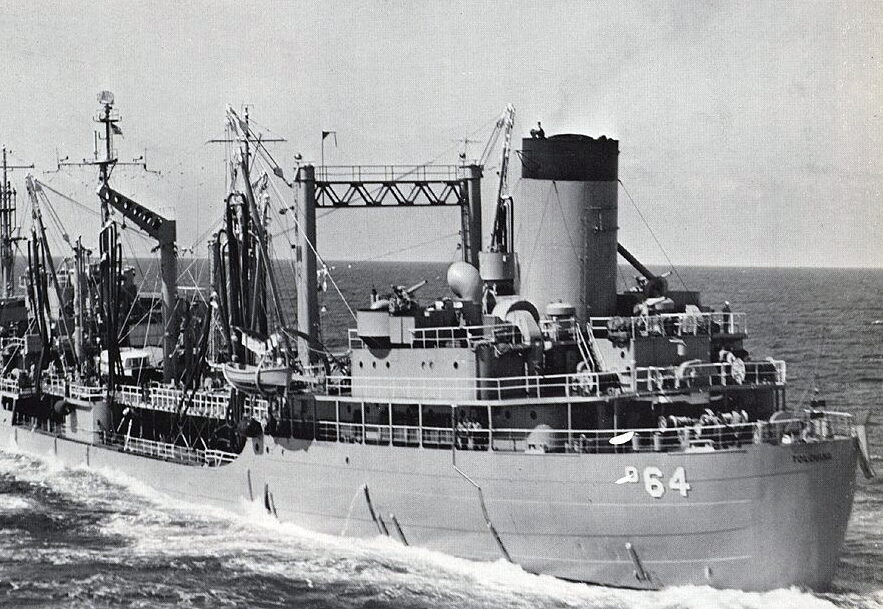
I served on two ships. The first was USS Tolavana AO-64, a rusty ship with an unfriendly crew. As the new guy, I found only one man who made any effort to know me. Fortunately, I was transferred early to my favorite duty station USS Platte AO-24, a ship-shape vessel with a much friendlier crew.
From your entire military service, describe any memories you still reflect back on to this day.
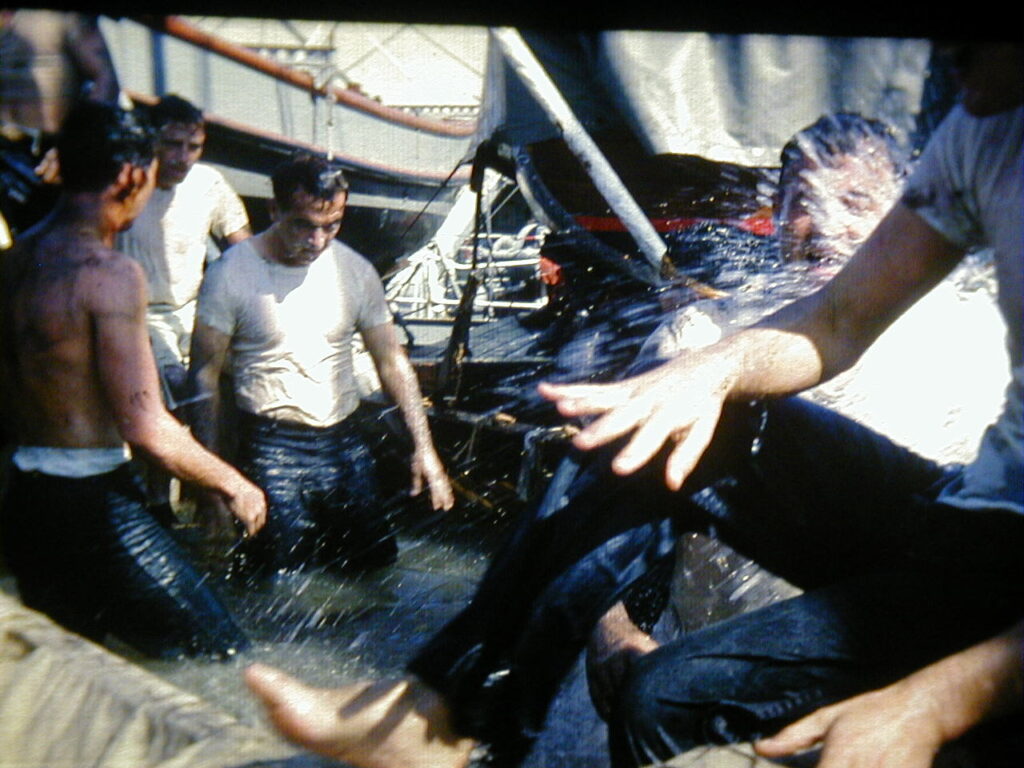
Oh my, there are thousands, and they constantly rumble through my mind. I love it too. Some are good memories, and some are bad memories, but they are all still welcome anytime. I tell you, it was quite an experience, and I am so grateful that I decided to enlist when I was just eighteen years old. I am seventy-six now and still a sailor at heart. I wish every young man and woman could have the courage to get away from home and see the world.
Crossing the Equator.
A Navy ship crossing the Equator follows an age-old procession of vessels, each making a historical journey that will live in the hearts of its crew for the remainder of their lives. Those crew members who have made the passage are members of The Ancient Order of Shellbacks and have been accepted into the deep reaches of King Neptune’s Realm. Those newcomers daring to make the crossing are mere pollywogs in comparison to their more seasoned brothers. On the Platte, out of a crew of three hundred and thirty men, we had in all eleven Shellbacks, and they had to take charge and help us be initiated into the Order. It was an intricately involved process that began with a morning mutiny. The first thing I noticed different when I made my way to the mess deck for breakfast, the mess cooks had all been replaced by the ship’s junior Officers, by Order of the Captain. They all seemed to be enjoying their part in the upcoming festivities, and none of us really had any idea of the complexity of what was to come later.
The word was soon passed that the pollywogs would now take over the ship and hunt down all the Shellbacks. Of the eleven, only one of them was safe from the mutinous activities, and that was the Captain. Since we were not going to stop the ship and hold our ceremony, the Platte had to remain underway, and the Captain would have the Conn for the rest of the morning. Everyone went out onto the cargo deck, and there we found several of the Shellbacks already in captivity.
A large cargo net was stretched out on the deck, and the small group of Shellbacks was herded onto it while it was tied up around them. Then a cable attached to the net raised them up off the deck about five feet, and a team of pollywogs manned a saltwater fire hose to begin spraying them down. All hands were there to see this sight, and we could see the Captain upon the starboard wing, sitting in his chair, enjoying the action below. Suddenly, someone yelled, “Hey, that’s Chief Thompson.” The Radioman Chief was dressed in dungarees and was the second man holding the fire hose. Chief Thompson was one of the eleven Shellbacks on board and hiding in plain sight; he had just been discovered. He was quickly chased down and became a prisoner himself.
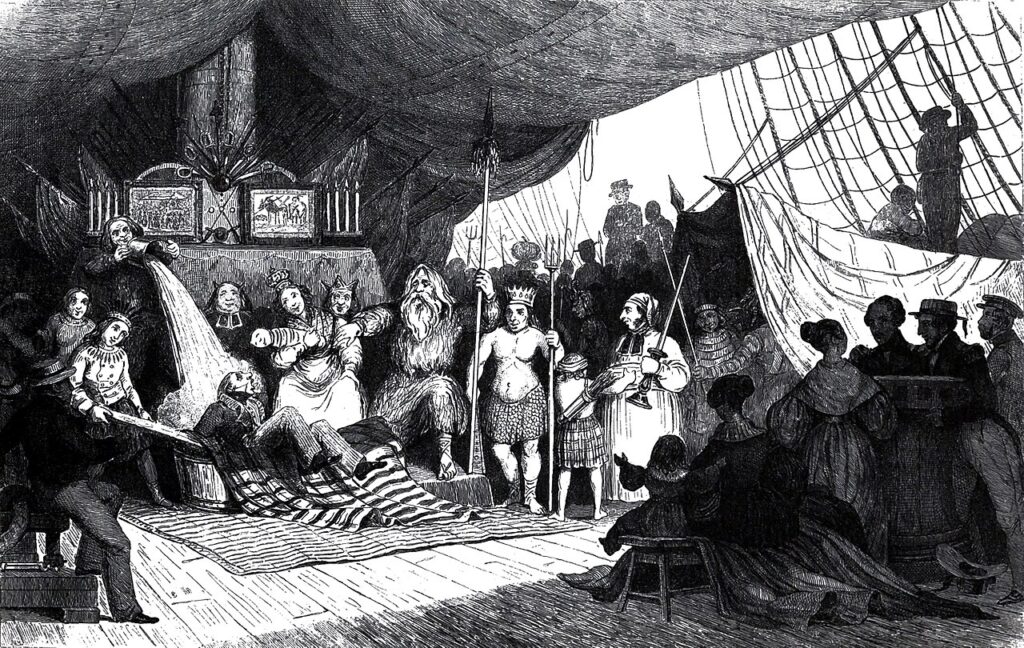
Everyone’s attention went back to the bridge as someone noticed another of the junior Officers standing on the signal bridge looking down at the Captain sitting in his chair. The Captain held a cup of hot coffee, and the Officer above held a bucket. He hoisted the bucket over the Captain, about eight feet above him, and upended it. Seawater cascaded down and drenched both the Captain and overflowed his cup. He cringed at the icy seawater, looked up, and got a second bucket of water in his face. He then turned his coffee cup upside down to empty the water and gave the Order for the ceremony to begin.
All pollywog activity subsided, the captives were released, and all hands not on watch were herded to the forward well-deck until the official business could begin. Three hundred men crowded onto a space that was not designed to hold so many, and they stretched from before the superstructure all the way to the forecastle, or bow, for the next several hours. Those eleven Shellbacks then took positions of authority in the King’s administration. As lowly pollywogs, we were to be held in contempt and charged with unlawfully attempting to enter into the Watery Realm of King Neptune.
The characters in the royal court included; King Neptune himself, his royal wife, his royal baby, a royal physician, a royal barber, and the illustrious Davy Jones himself to oversee the initiations and present the charges against each pollywog.
All pollywogs were taken in alphabetical order and given subpoenas to appear in person at once before the Royal Court of the King. They have all been charged with trespass and must answer why they believe they have a right to proceed. All of us, on our knees from the moment we are taken to the well deck until we crawl all the way up and over the 01 level of the superstructure to the cargo deck, is brought before the King and read the charges by Mr. Jones. We are then judged by the King and sentenced to perform several necessary rites before we may proceed.
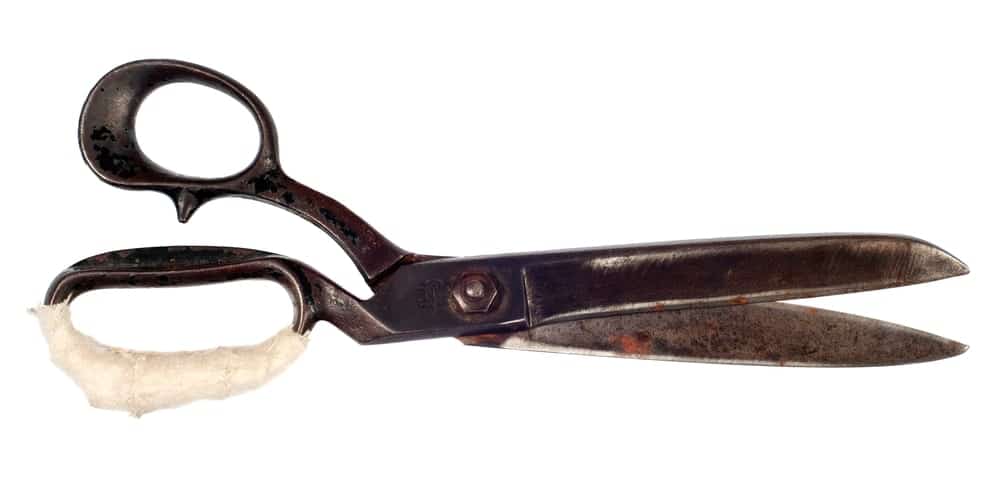
The first rite of passage begins with treatment by a physician with a tonic, black and oily, with a lot of pepper and astringent flavors. It is squirted down our throats and instantly causes choking and burning.
Then a barber stands by to remove any unwanted hair that he deems inappropriate for a future Shellback, and with a sheep shear, I might add. It isn’t very sharp with, so there is lots of tugging and pulling before the stray lock of hair is gone for good.
When healthy and cleanly shorn, each man is then brought before the royal baby. This Shellback is usually a large and hairy guy with a big belly. He wears only a diaper, and his naked belly is swabbed with grease, oil, and perhaps peanut butter for good measure. The offending pollywog must make the baby happy by kissing his little belly button. As each man comes nearer to the task, his head is grabbed by his ears, and his face is rubbed deeply into the greasy belly fat until he gets a large share of the goo over his face. That seems to make the baby more content, and the process continues from that point.
At the point where I had just personally contented that baby, I found myself facing what was called the royal intestine. I had not heard of it before, so they must have kept it a secret.
Standing next to a canvas tube, a yard in diameter and about twenty feet in length, was the Captain. Evidently, he had come below to enjoy the ceremony more closely. The tube was lying on the deck, and it stretched aft toward where a large water tank had been constructed. The canvas tube had been filled with what most people would describe as garbage. But they would be wrong about that. Garbage is noticeably composed of vegetables, meat, and various other foodstuffs thrown away as no longer edible. To be sure, what filled that canvas gut was a gray slime, oily, rank, and foul. It had the consistency of thin oatmeal, and as the tube was lifted for my entrance, I was to enter it and crawl aft to its conclusion; it seeped out and spilled onto the deck what a fetid aroma wafted from within. My throat constricted, and the burning increased as I became aware of the foulness that lay before me. I knew I would have to crawl through that tube and do it to become a Shellback.
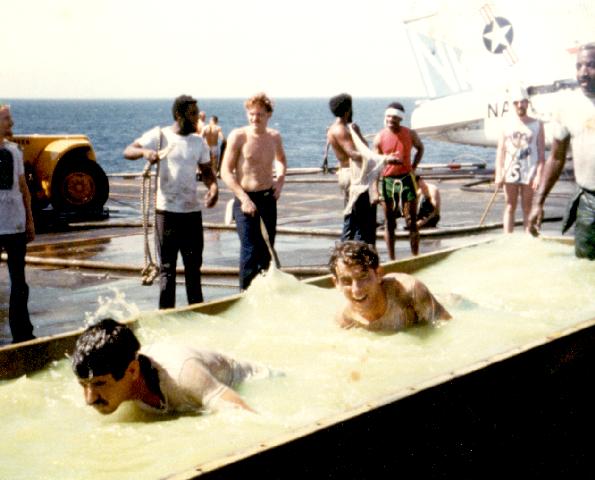
As I ducked low and entered the tube, I realized I could stay on my knees and my elbows, thus keeping my face out of the goo as I crawled forward. I was elated at the prospect, but that only worked for about the time it took me to crawl into it completely whereupon the Captain stepped onto my back and put his full weight on my entire body. My face plunged downward into the morass below, and the stuff flooded my eyes, ears, and nose. I did manage to keep my mouth shut, so I must not have screamed as I was able to continue for twenty feet without tasting the vile stuff.
There was a man in front of me, and I kept running into his feet as another man behind crawled into mine from time to time. It seemed an eternity until the end was reached, and I saw the light through the greasy fog as, at last, my face broke into the open air. I gulped in the fresh air, not caring at that point what filth covered me.
The freshness washed away the choking miasma of the royal intestine, and I found myself being handled by others, pulling me from the gut and standing me upright. They helped wipe clear my eyes and nose and pushed me forward onto a wooden plank, and I was being reborn.
If we had stopped mid-ocean to hold this ceremony, I would have been thrown overboard, but not so today. We were still underway and the tank constructed on the cargo deck was a wood and canvas, sea water-filled swimming pool about twenty feet across and four feet deep. I was pushed over the edge into the cold water and plunged under the surface. Men grabbed me and pulled me up out of the water. As I gasped for more air, they shouted at me, “What are you?” All through the ceremony, I had been asked that, at each step in the progress of my torment. My answer was to have always been, “I am but a mere pollywog, Sir.”
But now, before it finally occurred to me the truth of my situation, I had to be dunked two more times and asked that question. I realized at last that I was now a Shellback, and I proudly yelled, “I’m a Shellback, Sir.” I was released and pulled out of the tank to the dry deck.
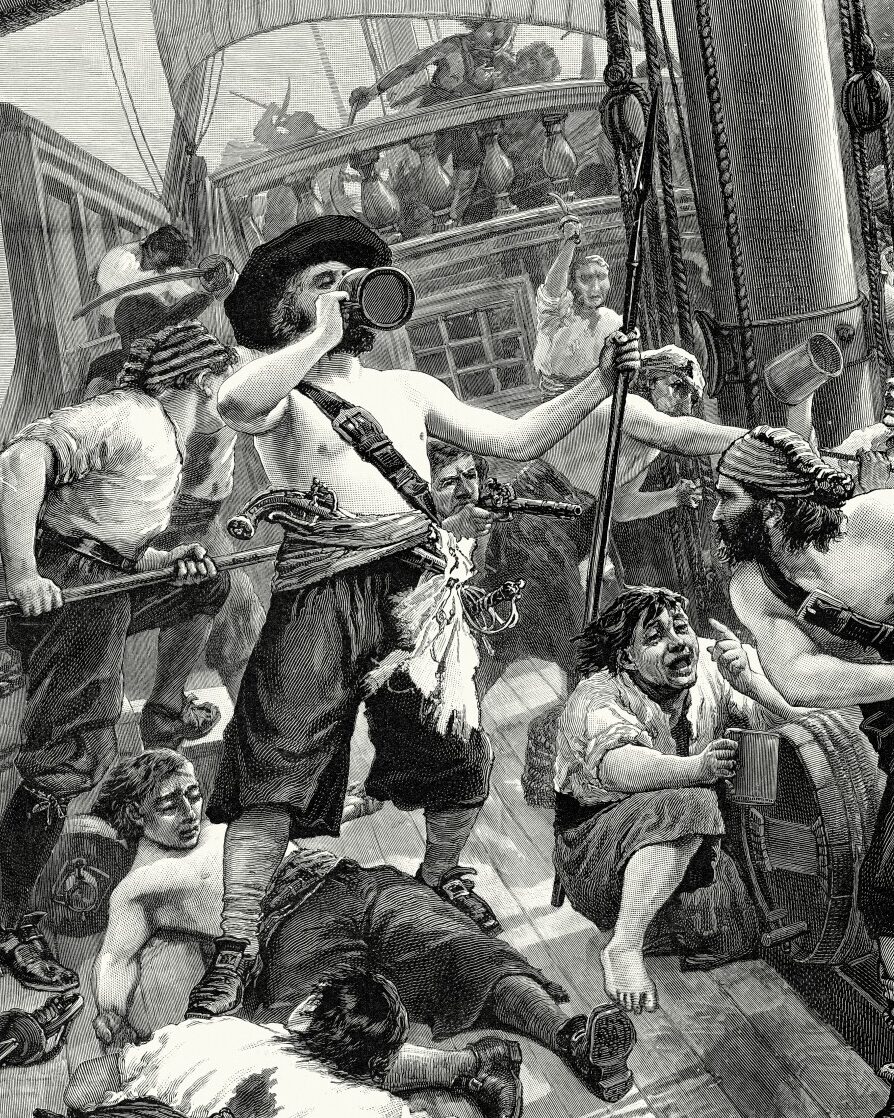
Many others already there had survived the ceremony as I had, and we were all overjoyed to be free of the torment at last.
Since there were so many pollywogs and so few Shellbacks, they asked those of us who finished first to take part in helping handle all the others. I was only too happy, but first, I ran to my locker and grabbed my camera to document the ceremony.
My first photo was of the Captain as he stood over the XO and two of the Junior Officers. They knelt on the wooden deck at his feet as he led them in singing a sea ditty about a drunken sailor for the entertainment of the entire crew.
The barber, the physician, and the royal court were all at their duty as I stood to take pictures. I saw the baby grab one of the men and rub his face into that large belly smeared with all the sticky goo. I moved down the line toward the exit of the royal intestine, where I was asked to put the camera down and help refill the tube. It had lost much of its filling on the bodies of those of us who had already transited that foul stretch of canvas. Two men came with a shit can full to the brim with goo. It was a gray mass slopping around the edge as we hoisted it up. Two men on either side held the tube up and opened it as we poured at least thirty gallons of stinking foulness into the opening. An arm came through the pouring mess, and we finished, dropped the can, and grabbed it to help the man emerge. As we pulled, we realized it was the XO who was making his passage toward being a Shellback. We were so proud of him at that point. He had a big grin on his face that showed how much he appreciated the fresh air.
The entire day was spent on this task, and when we were finished, we all enjoyed freshwater showers and clean clothes. Most of what we had worn went over the side, including ruined shoes.
Everything was spoiled in that long tube, and for the next few years, if I stopped to think about that experience, I could smell it still. I certainly was a China Sailor now.
For the next day, we steamed southward, and all hands looked forward to liberty in Singapore. But that did not happen because the powers that be decided we were needed elsewhere, Yankee Station for a fact, and we turned around and steamed northward. War is Hell.
What professional achievements are you most proud of from your military career?
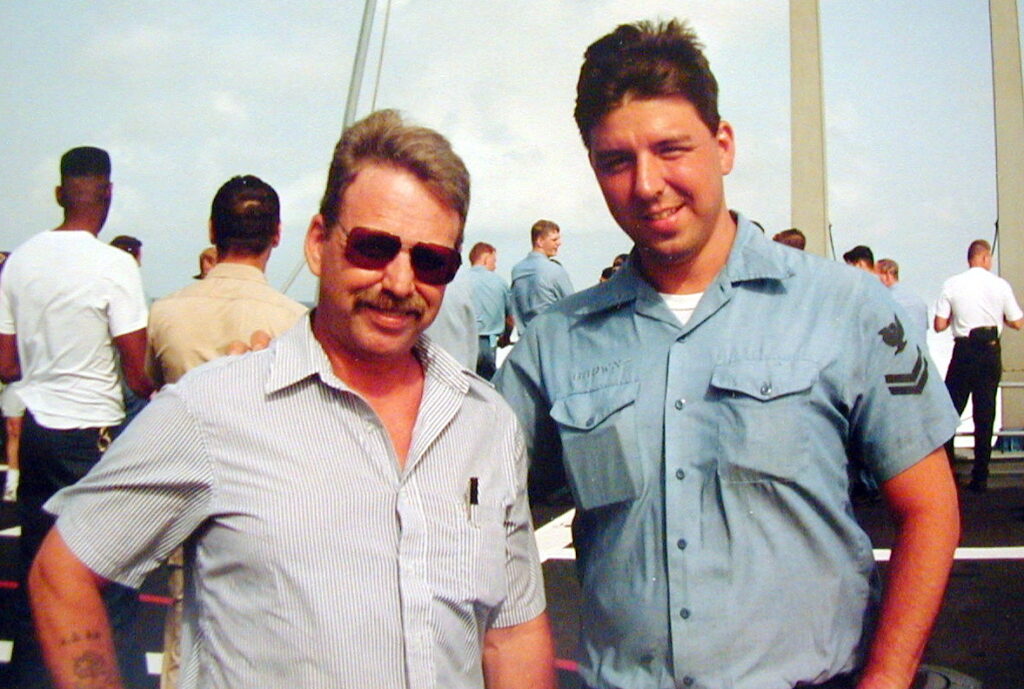
I made E5, Petty Officer 2nd Class, after just two years and ten months of service. I have always been proud of that. And just completing ET “A” School was a pretty significant achievement for me, and I wasn’t the brightest kid, you know.
As an Instrument Technician for a major chemical company, I quickly learned that my skill set was vastly superior to others who had not served or who had trained in other branches. I’m really not bragging either. Of all the guys and gals in my department, it was always the Navy people, ET, FT, DS, EM, IC, MM, and BT, who made the best mechanics and techs. And during breaks, everyone turned to listen to a story when a Navy puke was telling one.
Of all the medals, awards, formal presentations and qualification badges you received, or other memorabilia, which one is the most meaningful to you and why?

My campaign ribbons for service in Vietnam mean a great deal to me, and I am proud of that service. I am one of over five hundred thousand members of the American Expeditionary Force, and each and every one of them is my buddy. I relish welcoming them home when I see that Vietnam Veteran hat.
Which individual(s) from your time in the military stand out as having the most positive impact on you and why?

All the fellows who operated the electronic equipment I worked on, Radiomen and Radarmen, were the best part of my time in the fleet.
Lt. James Van Slyke, USS Platte’s Operations Officer, was the ultimate Officer and gentleman, a great first boss for my first job in life. I met him a few years back, and he retired as a Captain.
List the names of old friends you served with, at which locations, and recount what you remember most about them. Indicate those you are already in touch with and those you would like to make contact with.
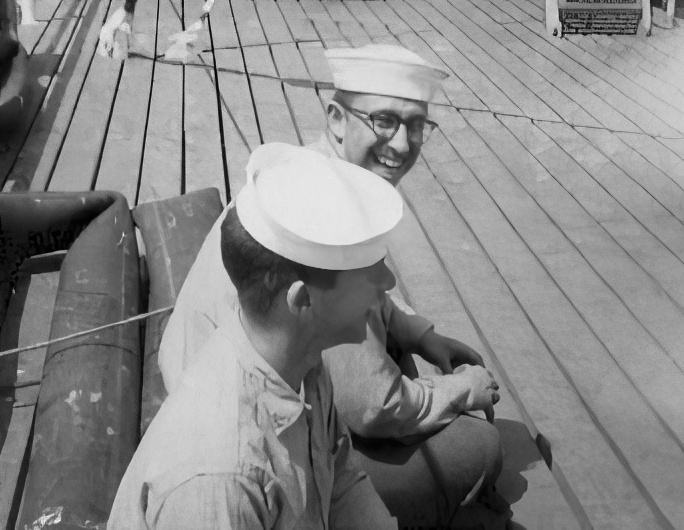
I have many memories of many guys, but few associations lasted after my enlistment expired. Gary Jones, Radarman, the leading PO in OPS Dept. and my good friend. He shared his family life with me for many home-cooked meals and holiday feasts.
Ray Brown, Radioman and liberty buddy in Hong Kong and Sasebo. He was a standup guy, and I learned much from him about Navy life. He was a Navy brat raised in Hawaii, and that will put an edge on a white kid new to the school.
I knew Chuck Salvato as a Seaman Recruit, and he was the life of that party. Our Company Commander tried to belittle him at every step, but he never succeeded, and Chuck was way too cool for him.
For all the others unnamed here, I was part of a veterans’ association that included hundreds of USS Platte crew members from Commissioning in 1939 to WW2, Korea, and through Vietnam and decommissioning in 1972. We all enjoyed the camaraderie we came to know when we reunited every two years from 2002 through 2018.
My hat is off to you, and I salute you when I think of how you served our country. I hope the young folks there are as strong as you. Thank you for your service.
Can you recount a particular incident from your service, which may or may not have been funny at the time, but still makes you laugh?

Oh yeah. In boot camp. The corned beef was something I had never seen in Newton, Kansas, and I had tried it, but the Navy used really fatty meat, and the color was an awful pink. It was really disgusting to even look at, and I could not contain myself at Chuck Salvato’s offer of his serving. To my everlasting day, I will never forget what came after I replied, “Nah, I ain’t eating that shit.”
What happened next came in a confusing roar of noise and movement. I saw all eyes turn toward me as a massive hairy arm came from across the steam line and wrapped around my neck. I felt myself being pulled off my feet as I was dragged bodily along the line pushing other recruits out of the way.
I was helpless in this strong grip and couldn’t maintain my footing to try to pull away. At last, I was pulled to the aisle, and I could then turn my head from side to side to see what was happening.
I had been grabbed by one of the cooks, a 2nd Class Commissary-man, and he now stood me at attention as the rebuke began. In front of an entire mess hall, I was the focus of everyone’s attention. Several hundred recruits thought to themselves, “Thank God that is not me.”
In a fog of confusion, I heard him ask me, “Did I hear you say I was serving shit in my mess hall?” To which I could only reply, “Sir, yes, sir.” Obviously, he had heard me say it, and a lie would cause me a lot more trouble, and I knew just to fess up and hope for the least damage.
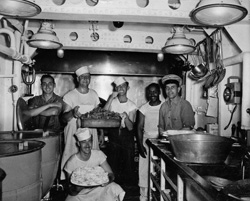
He then took me by the shoulder and walked me back into the kitchen spaces behind the line. This was the first time I had been there since coming to boot camp.
I was marched through the kitchen, stopping at each station in front of massive mixers, huge ovens, and long food preparation counters, all of the stainless steel and quite clean considering the amount of work being done by mess cooks and Service Weeks.
The man pointed out the lack of anything at each station, even looking like shit. I had to agree with him. At last, we walked out the rear door to the loading dock behind the mess hall. Several very large shit cans were waiting to be removed from the dock, and he stopped me right at the edge of one of them. A few Service Weeks were sitting on some stools off to the side, peeling potatoes, and they got very still when we walked out.
The cook then removed my white hat, and after flattening it and placing it on the top of my head, he said to me, “Now you just stand here at full attention until I think what to do with you. And while you wait, you can stand here and look at some real shit. You did not see that on my chow line, and is that clear?” Again I replied, “Sir, yes, sir.”
He left me then and returned to the kitchen. I stood as still as possible, and even when the wind blew my white hat into that shit can, I did not move.
One of the Service Weeks asked quietly, “What in the hell did you do?” I did not reply; that cook was standing right behind me for all I knew. All I could think was I was going to get a BCD, a Bad Conduct Discharge, out of this deal. I had not for a moment forgotten that my Company Commander was a cook. If he found out about this, well, I was probably going to be dead meat.
At last, the cook returned and told me to pick up my hat and put it on. It was quite slimy by that time, and I was aware that perhaps this was payback for the other guy’s dirty hat at my hands weeks before when I was a Service Week.
I was again marched out into the mess hall, and I could see that all 254 had left the hall. I did not know how long I had been held on the dock, and I knew that I needed to get back to the barracks as fast as I could. I was grateful that it was an evening meal, and we would probably have no Mr. Rye in the barracks that late in the day. Possibly I was going to survive this after all.

I was marched to the door and out in front of the hall. The cook pointed out the Chief down at the street, the man to whom the chow runners had to report, and said, “Now, you double-time it down there and tell that man what you said in my mess hall.” “Sir, yes sir,” and off I went. It was probably one hundred fifty feet down to that Chief, and my mind was racing. Now I was really going to get it with this guy. He was always in a foul mood. Just as I got to him and came to attention at his side, he turned and growled, “What do you want, maggot?” I was standing at attention as I said, “Sir, that man said they’re serving shit in the chow hall, Sir.” With that, he spun around toward where I was pointing and said, “Who said that?” I pointed to the cook by the door and said, “That man did, Sir.” The Chief growled something like, “Well, by God, I’m going to see about that. Beat it, maggot,” and he moved toward the door.
Without looking around to see the outcome, I raced up to triple time speed all the way to the barracks about four blocks away?every step of the way, I expected to be stopped and called back to attention. The farther I went, the more it occurred to me that I looked exactly like a thousand other recruits, all wearing whites and double-timing it back after chow. I really felt that I was going to survive.
What profession did you follow after your military service and what are you doing now? if you are currently serving, what is your present occupational specialty?

I remained in the field of electronics by hiring on with several companies that needed technical people. I repaired office recording equipment in the 60s (Salary too low to survive), I tested non-nuclear electronic components for atomic weapons in the 70s (Layoffs), and I repaired arcade games at an amusement park (a horrible place to work) until my final place of employment found me. I worked for Bayer Chemical Company for twenty-five years and retired in 2000 at age 55.
I found that job very rewarding, and with my Navy technical background, I felt I was successful at the type of work they provided me. That job fed my family, and it kept me interested until I found the time to retire at an early age and escape the toxic chemical dangers that had become a part of everyday life for so many years.
I am proud of the fact that I may have worked in the very first computer-controlled chemical plant in the world. Though the early operating systems in the mid-seventies were not overly complicated, considering the level of computer science of the time, those computers had grown and become unbelievably complex operating systems after twenty-five years. I always felt a part of that growth and still feel a certain pride also.
What military associations are you a member of, if any? what specific benefits do you derive from your memberships?

I’ve never been a joiner, but when I heard that some fellows were getting up a reunion group for my ship, I wanted in. And I guess I displayed so much fervor at being a part of it that somehow I ended up running the whole thing for many years. That was a new experience, but my wife is a smart cookie, and with her invaluable assistance, we made many joyous reunions for those guys over the years. We twice took them to San Diego, Las Vegas, Norfolk, Nashville, Colorado Springs, San Antonio, Washington DC, and Kansas City. They liked Kansas City, and I live pretty close to it too. Those reunions were a real hoot, let me tell you.
Patti and I would travel to future destinations on our own dime and try to find interesting places to visit at the following year’s reunion. We made contacts with hotels and tour groups and caterers to be able to make the experience an easy one for oldsters making such a long journey, and for some, very late in their lives. Our early reunions actually had WW2 Vets in the group. Most of our guys were Korean Vets, and near the end, the Vietnam Vets began to catch up with us.
For some of the people, men and women, it was the only vacation they had all year, and they looked forward to it. I tell you, it brings a tear to my eye when I recall seeing two grown men begin to sob like little girls when they find a shipmate they haven’t seen for thirty-five years.
More than one of them passed away after attending one of our get-togethers. Their wives always said that the men died happy after getting to meet again and happily revisit with someone from their Navy past. I know how it felt, too, because I saw Gary Jones and Ray Brown again after thirty-five years, which made it all worthwhile.
In what ways has serving in the military influenced the way you have approached your life and your career? What do you miss most about your time in the service?
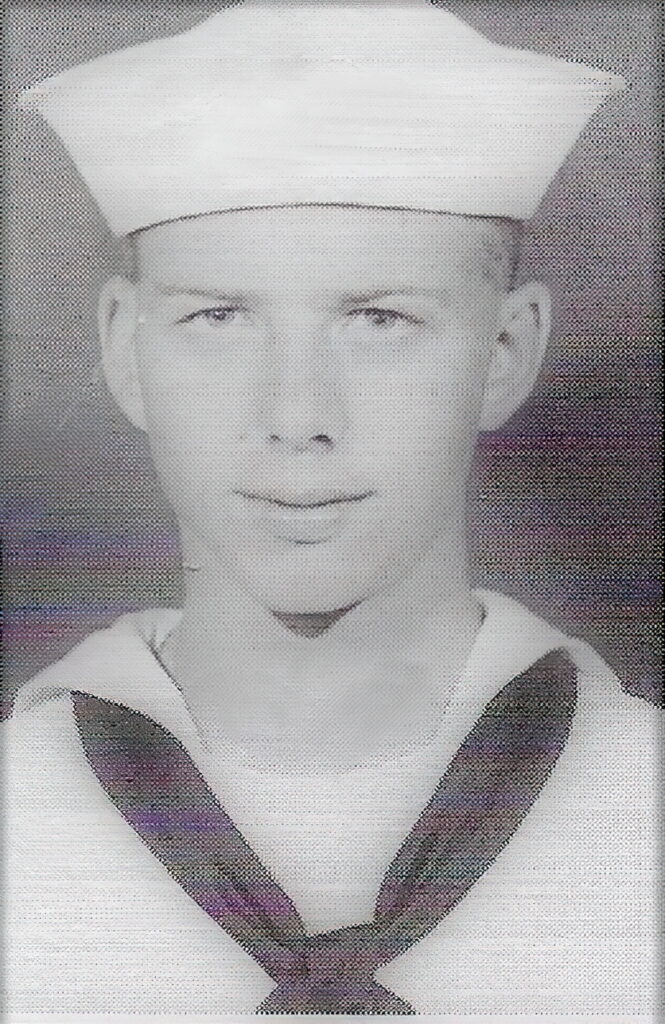
I can only say that I am the kind of man I am today because of my early foundation. But that didn’t come from my home life because until I got into the Navy, I was a non-person. My teen years were probably typical, just moseying around with no particular purpose or direction. Cars, beer, and teenage girls were my only interests. High school was not for me, and I spent most of each classroom moment staring out the window, listening for that bell.
My home life was pretty bad, and I had no one to tell me I needed to play it smarter in life. So I wandered from day to day until I graduated from high school and had to make a move away from home. The Navy was my first choice over any other branch of service as it seemed like something that I would find exciting if I really could “Join the Navy and see the world.”
What enlisting in the US Navy did for me was to wrench me out of that goofy-shit existence and make me toe the line. I knew that it was something I had to do, and the fellows calling those shots made it pretty clear at once that it was “Shape up or ship out.” I was in the Navy, and I had a job before me. I have since tried to be a team player at my work, and I saw firsthand that that could be a difficult thing for many people actually to do. The military regimentation beginning at age eighteen builds an internal mechanism that one cannot refuse. It does become second nature to you, and I see that as a good thing. Some do not, as I have seen and heard.
I really do not miss my time in service because, as I have said, my family is the most important thing in my life, and they come before any of my inner desires. So I do not miss the Navy, but I am happy to reunion when possible, and I can tell old sea stories at the drop of a whitehat. And that’s no shit.
Based on your own experiences, what advice would you give to those who have recently joined the Navy?

f any young person were to take the time actually to ask something of an oldster, I would be surprised. They do not think we know anything and so will never ask. If they do attempt it, they don’t even know enough about the subject of military life to be able to pose an intelligent question.
Supposing someone did ask, though. I would want to tell them that getting a useful trade out of your service time isn’t too much to ask after donating so many years of your life. Find a skill that interests you and can earn a living after you reenter civilian life.
Give it your all every day. Try to gain a higher rating as often as possible and experience what even a minor amount of leadership can feel like. It doesn’t come easy, and there are all kinds of stumbling blocks in your path, not the least of which is your best friends wanting you to stay down with them. That’s a soul killer if ever there was one.
Just remember, you won’t be taking them home with you when your enlistment is up. Oh, and if you have a choice, don’t let the cooks hear you bitching about the food. They don’t have a sense of humor.
In what ways has togetherweserved.com helped you remember your military service and the friends you served with.
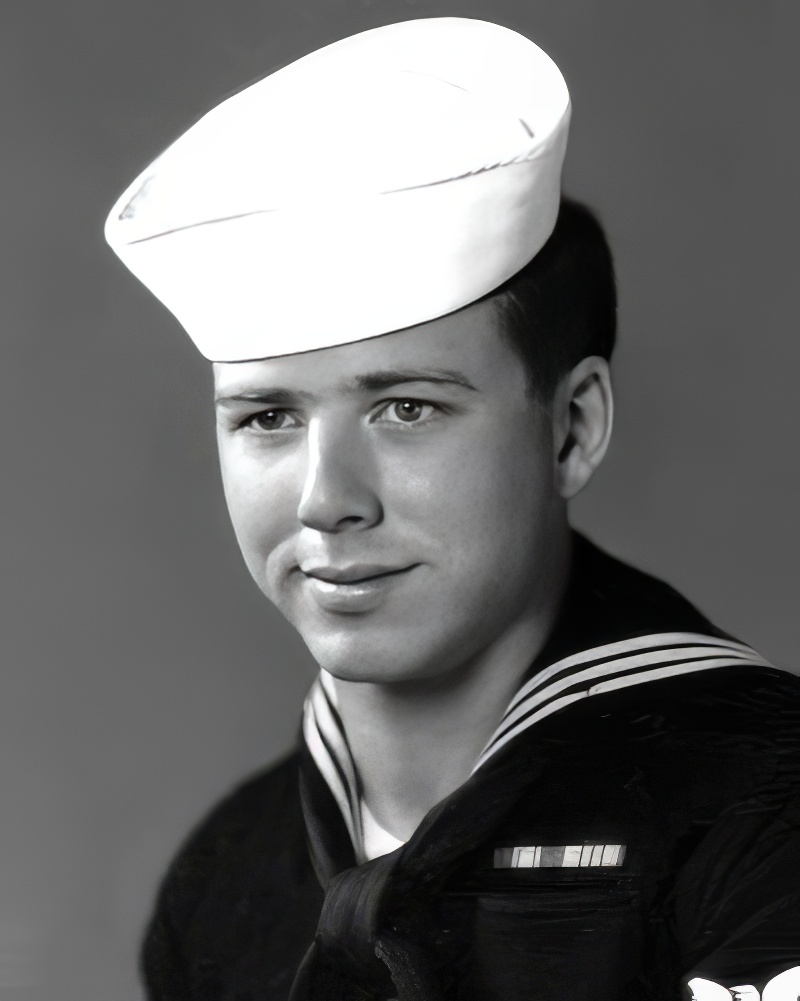
I appreciate the excellent forum you guys have provided for us. This makes it easy to gather our memorable moments and reorder them for the proper retelling. I will enjoy sharing my photos and look forward to meeting old friends from time to time. I will be telling everyone I know about your forum so that it may grow and find many others.
I heard about TWS from my buddy Chuck Salvato who I have yet to re-meet after all these years, but Chuck, I’m coming your way someday, old friend.
PRESERVE YOUR OWN SERVICE MEMORIES!
Boot Camp, Units, Combat Operations
Join Togetherweserved.com to Create a Legacy of Your Service
U.S. Marine Corps, U.S. Navy, U.S. Air Force, U.S. Army, U.S. Coast Guard

0 Comments